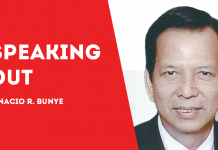
NORMALLY, I would just let it go. My training in non-defensive communication usually surfaces when caught in an ugly situation. However, when the attack is below the belt, irrational, and uncalled for, I also respond, in kind. Not that I couldn’t use the vilest language available — oh I do and I can, but we still need to retain some semblance of professionalism in our chosen field, don’t we?
Now, the campaign period is still four months away but boy an involved citizen’s posts on social media are taken by the minions of so-called leaders as an attack on their supposed performance. Like what? Were you born centuries ago when free speech was unheard of? Haven’t you heard of feedback? Do you want feedback constantly wrapped in icing? Are you disempowering the citizenry by silencing them through your orchestrated attacks?
These so-called leaders goading their supporters to gang up on a citizen who has something valid to say about governance or the lack thereof don’t deserve their elected posts at all! Why don’t you come down from your high horses, look around, and see for yourselves what you can do more for the citizenry and the community, and drop your vapid sloganeering that has become a source of ridicule?
It’s hilarious that sycophants use insults and personal attacks against those who have something to say, and yet, these leaders appear holier-than-thou in person, like they can’t break a glass. The height of incongruity.
You know, authenticity is difficult, nah, hard, especially for politicians, but the citizenry should demand it. Playing the good guy yet authorizing to demonize those who evaluate your so-called performance is an insult to the intelligence of the governed.
This writer is an advocate for good governance, accountability of civil servants — elected or career, transparency in government transactions, responsiveness in public service, and delicadeza which is no longer present in the consciousness of today’s politicians. I believe in public consultations as a hallmark of participatory democracy. The citizenry shouldn’t be disregarded or ignored in the decision-making process that could have benefited from their input had they been consulted. I believe in a good feedback mechanism — not a “praise mechanism” that adds to the bloated egos of so-called leaders. Don’t we have enough of that all these years?
Finally, it is wise to read this press release published by the Supreme Court on October 16, 2024, which I am stating in toto:
SC: Statements against Public Officers Not Slanderous When Related to the Performance of Official Duties
“The Supreme Court emphasized that statements against public officers do not constitute oral defamation or slander when these concern their discharge of official duties — unless done maliciously.
In a Decision written by Senior Associate Justice Marvic M.V.F. Leonen, the Supreme Court’s Second Division acquitted Argelyn M. Labargan (Labargan) of grave oral defamation against Aileen R. Macabangon (Macabangon).
Macabangon is a barangay kagawad of Muntay, Kolambugan, Lanao del Norte. She mediated between Labargan and Edna Jumapit (Jumapit) in a barangay conciliation to settle their dispute.
As Macabangon was passing by Labargan’s house one day, the barangay kagawad heard Labargan yell from their terrace that Macabangon was dull, uneducated, ignorant, and biased towards Jumapit. As the terrace was beside a highway, many people heard Labargan.
The Municipal Circuit Trial Court found Labargan guilty of grave oral defamation. The Regional Trial Court and the Court of Appeals upheld the conviction.
In acquitting Labargan, the Supreme Court ruled that offensive remarks against public officers do not constitute defamation if they relate to their discharge of official duties, unless actual malice is proved.
Under Article 358 of the Revised Penal Code, there is oral defamation or slander when (1) there is an allegation of a crime, fault, or flaw; (2) made orally; (3) publicly; (4) maliciously; (5) towards a person, alive or dead; and (6) such allegation tends to cause dishonor on the person defamed.
As the law assumes that a defamatory allegation is malicious, or made with knowledge that it is false, the person who made the defamatory remarks has the burden of proving there was no malice.
However, when it comes to defamation against public officers in relation to their duties, the prosecution has the burden to prove there was actual malice in the defamatory remarks. The Court recognizes that the right to free speech empowers citizens to hold public officers accountable because public office is a public trust.
In the present case, Macabangon is a public officer. Labargan’s statements against her were criticisms of her competence as a barangay kagawad, specifically her supposed bias against Labargan in the barangay conciliation proceedings.
As the statements relate to Macabangon’s duties, the prosecution must prove actual malice on the part of Labargan, which it failed to do.
The Court concluded by stressing that while Labargan’s statements against Macabangon may be offensive, they are not actionable by themselves. “Being ‘sensitive’ has no place in this line of service, more so when allowing otherwise has the potential to create a chilling effect on the public,” that is, citizens will be afraid to criticize public officers.”
Do I need to say more?
P.S. You can read the full text of the Decision in G.R. No. 246824 (Labargan v. People, December 6, 2023) at https://sc.judiciary.gov.ph/246824-argelyn-m-labargan-vs-people-of-the-philippines/.
***
The writer hosts Woman Talk with Belinda Sales every Saturday, 10 a.m. at 91.1 Balita FM Tagbilaran City. Email at belindabelsales@gmail.com. X @ShilohRuthie./PN







